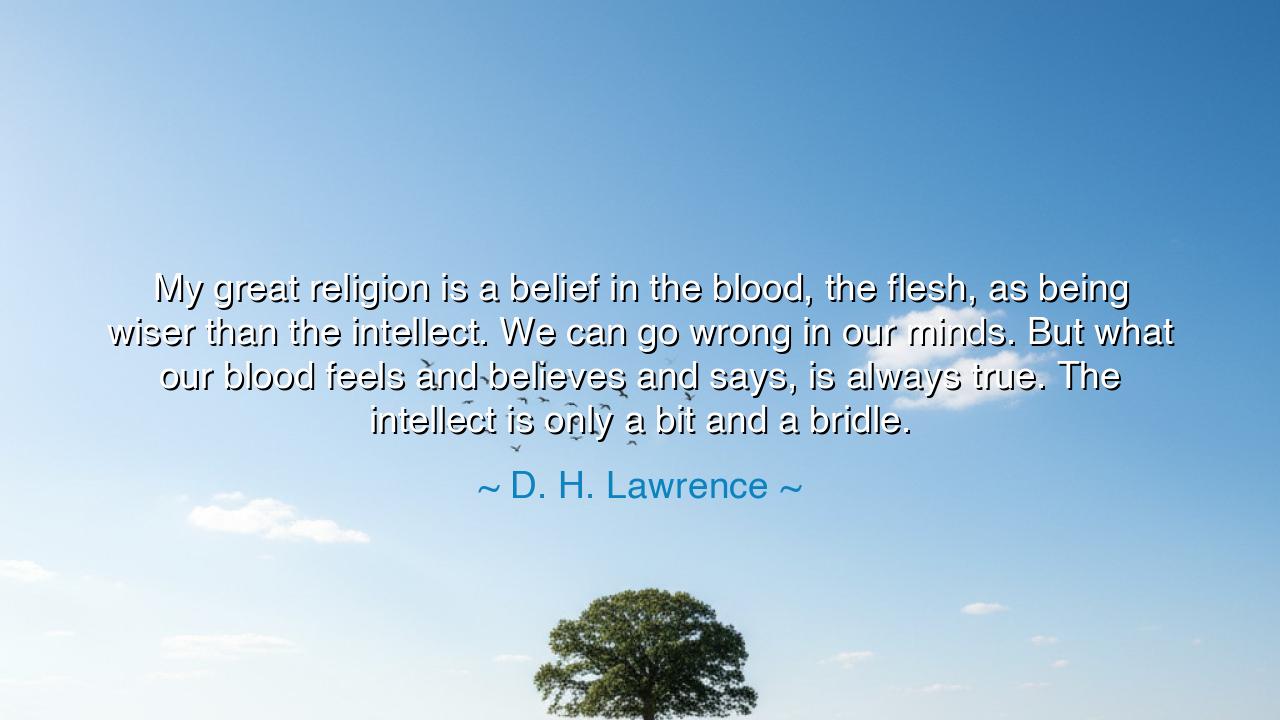
My great religion is a belief in the blood, the flesh, as being
My great religion is a belief in the blood, the flesh, as being wiser than the intellect. We can go wrong in our minds. But what our blood feels and believes and says, is always true. The intellect is only a bit and a bridle.






“My great religion is a belief in the blood, the flesh, as being wiser than the intellect. We can go wrong in our minds. But what our blood feels and believes and says, is always true. The intellect is only a bit and a bridle.” Thus spoke D. H. Lawrence, the poet-prophet of passion, whose words burn with the fire of a man who sought truth not in the mind’s abstractions, but in the heartbeat of life itself. In this declaration, Lawrence unveils his creed—the religion of the body, of instinct, of the primal forces that pulse beneath reason. He calls upon us to remember that before man became a thinker, he was a living creature, bound to the earth, to desire, to rhythm, to the mysterious wisdom of nature that speaks not in logic, but in feeling.
Lawrence, born amid the clanging machines of industrial England, lived in an age when intellect reigned as the new god—when science and machinery sought to replace spirit and flesh with calculation. He rebelled against this tyranny of thought. To him, the intellect was not the enemy of truth, but a tool that must serve the deeper wisdom of the body. When he says, “the intellect is only a bit and a bridle,” he likens reason to the harness placed upon a horse—not to destroy its strength, but to guide it. The danger, he warns, lies in mistaking the bridle for the horse itself, in letting the mind believe it rules over the very blood that gives it life.
This belief—that instinct is wiser than intellect—flows from the oldest wisdom of humankind. The ancients, too, understood that man is not divided into body and soul, but that the two are intertwined. The Greeks spoke of thymos, the spirited heart that drives action and feeling; the Taoists of China sought harmony between the energies of nature and the breath of life; even the prophets of Israel wrote that wisdom dwells not only in the mind, but in the heart. Lawrence revives this ancient understanding in a modern world that has forgotten its own pulse. His religion is not of temples or creeds, but of the living flesh—the sacred realization that to feel deeply is itself divine.
Consider the story of Joan of Arc, that young maiden who followed the voice within her heart, though all the intellects of her age called her mad. Learned men doubted her, kings hesitated to trust her, yet she, guided by the fire of instinct and conviction, led armies and changed the course of nations. Her blood spoke to her more truly than the counsels of reason, and even in death, her faith in that inner voice was unshaken. She is a living parable of Lawrence’s creed: that the heart’s wisdom, the intuition born of the blood, often knows what the mind dares not admit.
Yet Lawrence’s vision is not a rejection of thought—it is a plea for balance. He does not ask us to abandon intellect, but to reorder it, to place it once again in service of the living self. For the mind, when divorced from the body, becomes cold, abstract, and sterile; it invents machines but forgets compassion, builds empires but destroys the soil beneath them. The blood, however, remembers—it remembers hunger, desire, rhythm, and rest. It remembers that joy cannot be engineered, and that truth, like the beating of the heart, is felt before it is understood.
In this light, Lawrence’s words become both warning and awakening. He reminds us that when we silence the body, when we numb our instincts and distrust our feelings, we sever ourselves from the very source of our humanity. The one who lives only in the mind becomes hollow, mechanical, detached from the earth and from others. But the one who listens to the whispers of the blood—the pull of intuition, the call of emotion, the surge of life—walks in harmony with creation itself. For the blood is ancient, older than civilization, older than reason; it carries the memory of every ancestor, every love, every song that ever kept the species alive.
Therefore, let this be the teaching: do not let intellect smother instinct, nor let reason drown the voice of the heart. Learn to think, yes, but think with the pulse of life beneath your thoughts. Let your decisions be guided not only by logic, but by the quiet knowing that rises unbidden from within. Feel deeply. Trust the tremor that warns, the warmth that affirms, the ache that calls you to move. For in these sensations lives a wisdom purer than argument and older than words—the wisdom of being alive.
And so, when D. H. Lawrence speaks of his “great religion,” he is not preaching rebellion, but remembrance. He bids us return to ourselves—to the truth that the body is not base but sacred, that the blood’s language is the voice of the divine within. The intellect, noble though it may be, is the servant, not the master. The heart, the flesh, the pulse—these are the instruments through which the human spirit finds its truth. To follow them is to live fully; to deny them is to perish unseen. Let us then live, not as thinkers detached from life, but as beings who feel, act, and know through every breath—for it is through the blood that truth speaks, and through the flesh that the spirit is made whole.






AAdministratorAdministrator
Welcome, honored guests. Please leave a comment, we will respond soon